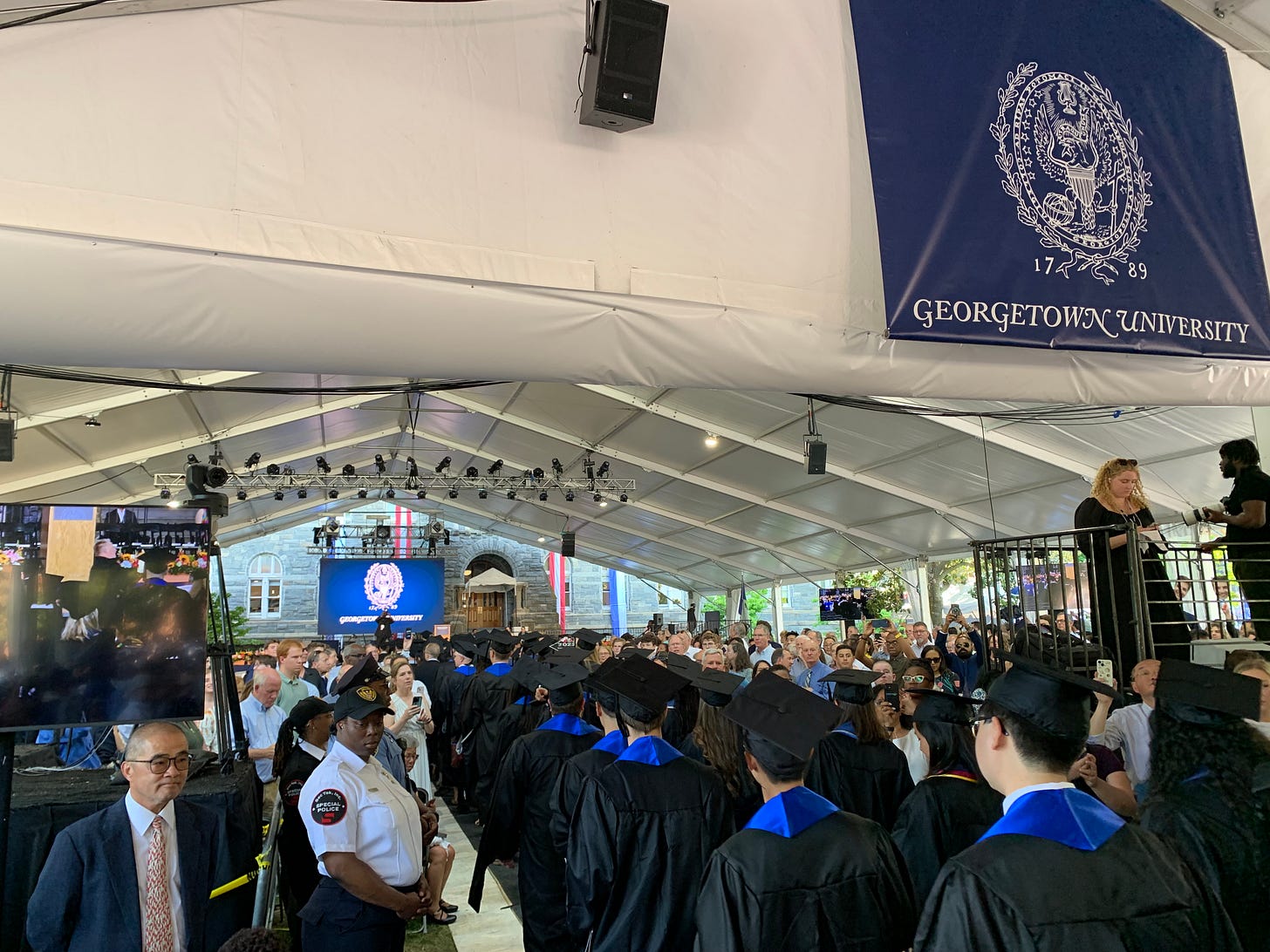A University Gets Free Speech Right
Georgetown’s School of Foreign Service handles controversy about a Russian graduation speaker like an adult—and in a manner consistent with free speech for all.

My son graduated this past weekend from Georgetown University’s School of Foreign Service (SFS)—the nation’s oldest school dedicated to diplomacy and international affairs. Ahead of the ceremony, the school’s interesting decision to dispense with custom and feature a “Call to Freedom” on behalf of political prisoners around the world ended up making national news.
Among the three speakers featured in place of traditional honorary degrees was Dasha Navalnaya, the 22-year old daughter of imprisoned Russian opposition leader, Alexei Navalny. A group of undergraduate and graduate students in the school, including some Ukrainian nationals, opposed Navalnaya’s speaking engagement based on her father’s past statements about immigrants, Crimea, and Georgia (Navalny has recently reversed his position to say Crimea should be returned to Ukraine).
The students petitioned the SFS to remove her from graduation, but laudably SFS Dean Joel Hellman said: “We do not disinvite speakers on the Georgetown campus, and we don’t dissuade speakers from speaking.”
On the day of the graduation ceremony concerns about rain were more prominent than concerns about disruptions but tension was palpable. To the genuine credit of the school, its students, and its graduation speakers, the event unfolded as a touching and sincere tribute not only to imprisoned journalists and activists around the world—but also to the practice of free speech in our own country.
After Debra Tice, the mother of Austin Tice, a journalist and GU graduate who was kidnapped and imprisoned in Syria in 2012, spoke with amazing poise about her own son’s situation, Dasha Navalnaya took the stage. A group of students rose and turned their backs to her, some holding Ukrainian flags, but otherwise engaging in a respectful manner.
Navalnaya spoke out forcefully against Putin’s corrupt regime and his war on Ukraine:
My dad, Alexei Navalny has been fighting against Putin since before it was mainstream. For over two decades, he's been fighting against corruption, misinformation, and dictatorship. For this fight and for opposing a brutal dictator, he has now served two and a half years in cruel isolation cells without necessary medical care. My father has risked further charges for speaking out against an unjust and horrible war in Ukraine: he's now facing 30 more years in prison for speaking up.
When I first was invited to speak at the ceremony, I immediately had two thoughts: first, it's a bit ironic and shocking that I'm going to be lecturing the new cohort of graduates, considering I've yet to receive my own degree, to which Dean Hellman politely said “no pressure”—thank you for that!—and secondly, it would be truly an honor to stand on the stage with two other incredible speakers to shed light on such an important subject as political prosecution.
Like all of us here, my dad believes in freedom of speech, in freedom of the press; he believes in fair elections; he believes in democracy, and right now he and many others are being punished for those beliefs. In 2021, my dad went back to Moscow after he was poisoned by a nerve agent, knowing he would get arrested because, simply put, you can't run away from your problems. You have the hard conversations; you search for the truth; you stand up to authority when you know they're not doing the right thing. You continue to persevere and overcome because actions speak louder than words.
I miss my dad every single day. He doesn't have to be yours, but he's my hero and a leader that's been fighting and lifting the voices of those who continue to struggle and die from Putin's authoritarian regime.
Navalnaya concluded by asking the Georgetown students not to lose their passion and drive like their burned-out elders around the world who have caused so much misery for others. Despite the few protesters, Dasha Navalnaya received enthusiastic and loud applause from other students and most of the crowd assembled for the ceremony.
Evan Mawarire, a Zimbabwean pastor and pro-democracy activist who has been imprisoned and tortured numerous times in his life, spoke next. He thanked the school for allowing the protest and said in his country there’s no guarantee the dissenting students would “either go home or graduate after an action like that.” He also said he told “young Dasha” after she sat down that she “took it like a champ.”
The three speakers made a powerful case for American ideals of freedom of speech and worship and fundamental rights to political assembly, protest, and a free press. All three speakers have direct personal experience with what life is like without these freedoms—far grimmer and more consequential than any uncomfortable college experience, that’s for sure.
Although campus political intrigue pales in comparison to the ongoing stories of repression of individual rights carried out by dictators and authoritarian regimes around the world, it was encouraging to see Georgetown stand up for free speech in its fullest context—including the right of people like Dasha Navalnaya to speak about her experiences without being cancelled by activists, and the right of others to protest her speech in their own way.
Georgetown and its students deserve congratulations not only for their academic achievements, but also for showing the country, in one small moment, that genuine freedom of speech carried out in a respectful manner is not yet dead in America’s universities.


